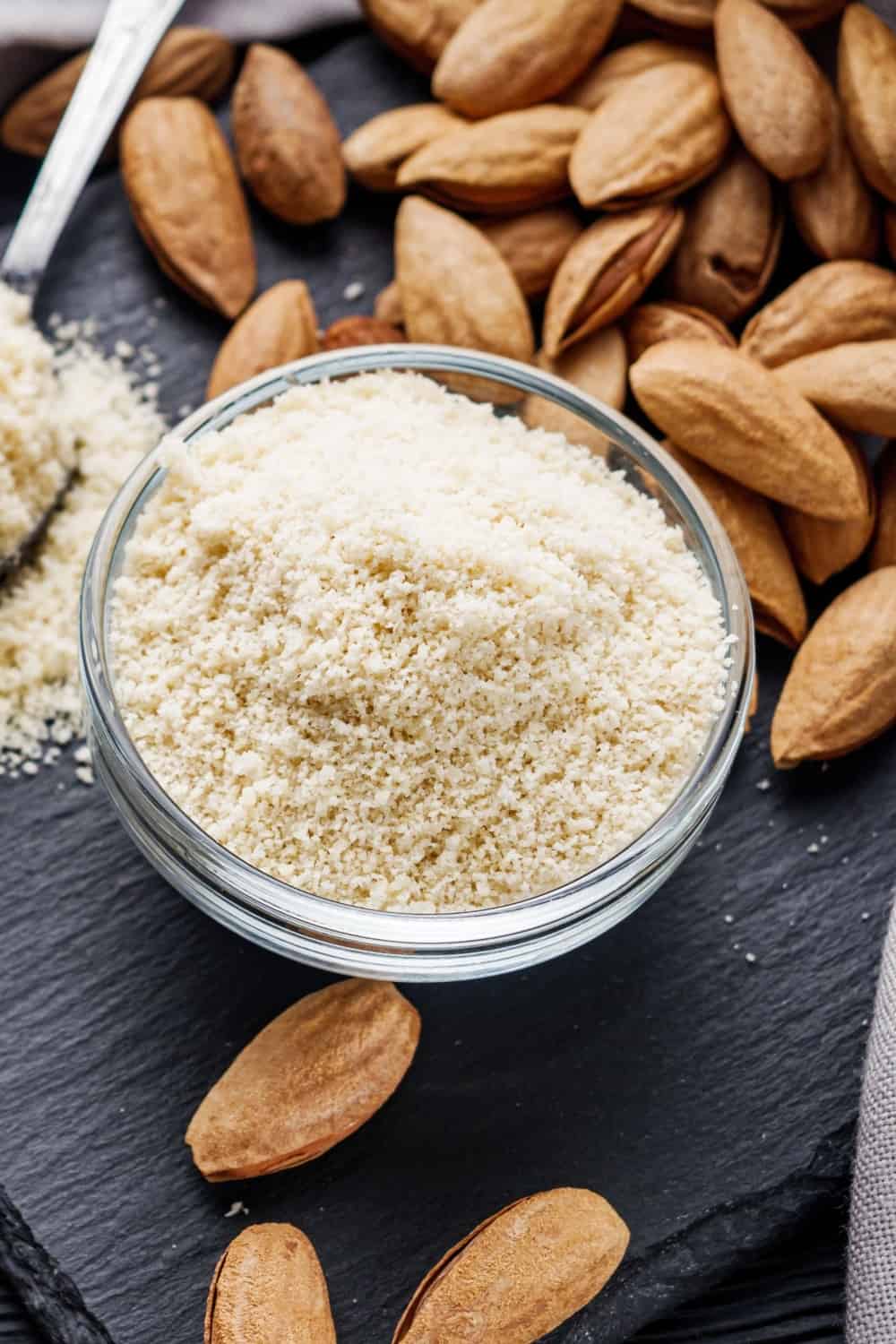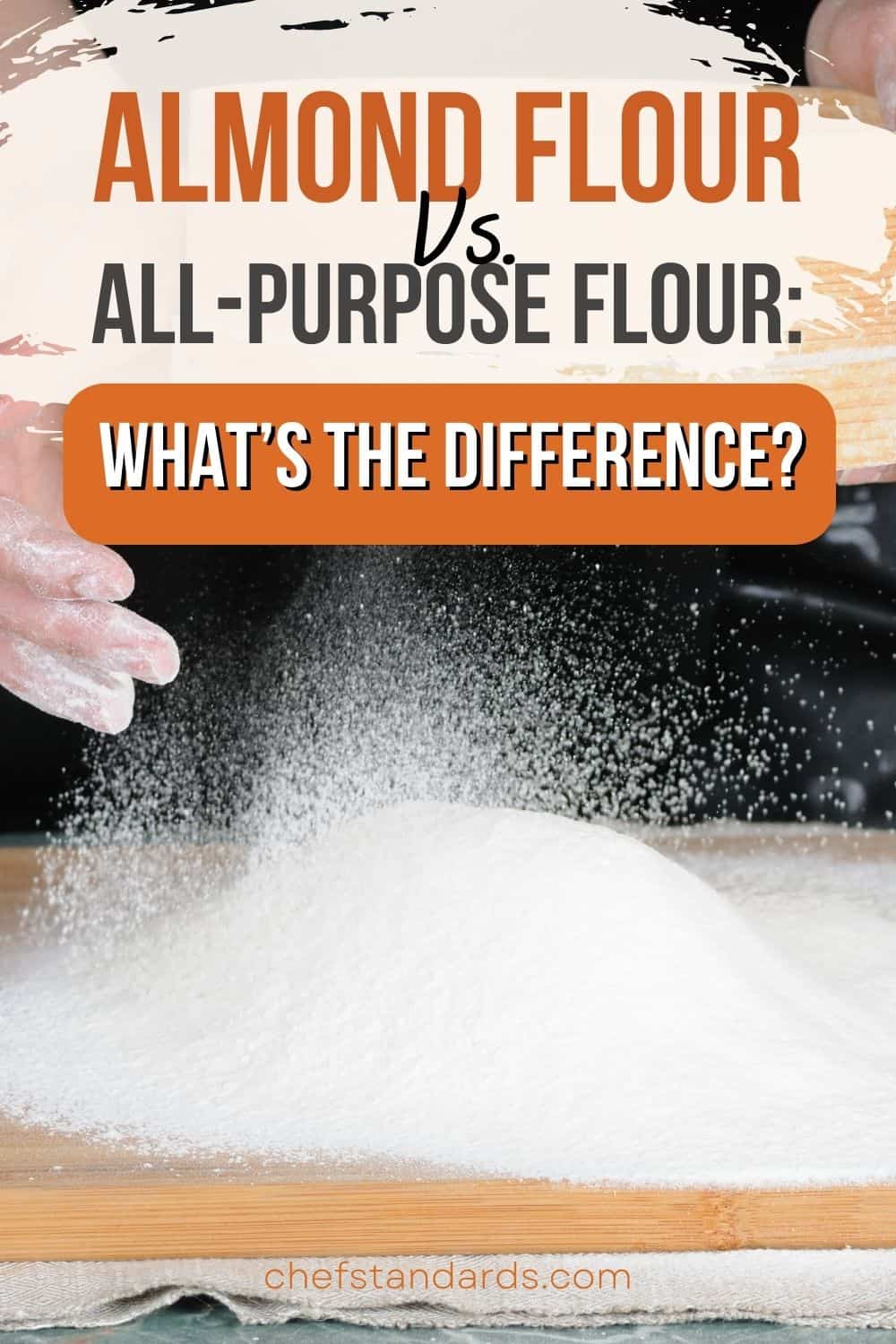Whenever someone asked me about the difference between almond flour vs all-purpose flour, I would just say that almond flour is gluten-free while AP flour is not.
Through time I’ve learned that there are more differences between these two types of flour many people don’t pay attention to. For example, almond flour has a shorter shelf life and higher fat content than all-purpose flour.
I’m so excited about sharing all this with you today! Let’s first start with a brief summary of the differences between almond flour and all-purpose flour:
| ALMOND FLOUR | ALL-PURPOSE FLOUR | |
| Gluten content | No | Yes |
| Fat content | High | Low |
| Keto and paleo friendly? | Yes | No |
| Common allergens | Almonds (tree nuts) | Gluten, wheat |
| Flavor | Nutty | Neutral |
| Shelf life | 2 - 4 months | 6 - 8 months |
| Use in baking | Cupcakes, cookies, muffins | Biscuits, breads |
| Absorbing properties | Medium (slightly less absorbent than AP flour) | Medium |
If you’re interested in an in-depth explanation of the differences between almond flour vs all purpose flour, you’ll find it below:
1. Gluten content

Flour is the type of ingredient that is used for making one of the most eaten foods in the world, bread. But most types of bread contain gluten.
Just like other wheat products, all-purpose flour is loaded with gluten. Contrary to it, almond flour doesn’t contain any gluten content. If you’re gluten-intolerant, then almond flour should be your first choice.
2. Fat content
The fat content in almond flour is significantly higher than that of all-purpose flour. In other words, almond flour adds more moisture to baked goods than all-purpose flour. For a more detailed view of fat content, see the table below:
| Fat content (per 1 cup) | ALMOND FLOUR | ALL-PURPOSE FLOUR |
| TOTAL FAT | 56 g | 1.2 g |
| Saturated | 4.3 g | 0.2 g |
| Polyunsaturated | 14 g | 0.5 g |
| Monounsaturated | 35 g | 0.1 g |
3. Keto and paleo-friendly?
Almond flour is keto and paleo-friendly, while AP flour is not. Now, I don’t know how many of you are familiar with keto and paleo diets, so I’ll explain them in a few sentences.
• The keto diet promotes getting more calories from fat and protein than carbohydrates. Given that almond flour has higher fat and protein content than all-purpose flour, it is considered keto-friendly.
• The paleo diet is about avoiding processed foods and focusing on consuming whole, healthy foods that people consumed during the Paleolithic Era (hence the name). Almond flour is considered paleo-friendly because it’s minimally processed from whole food.
4. Common allergens
Both almond flour and AP flour contain allergens. People who have allergies to tree nuts shouldn’t consume almonds. Also, people who are gluten-intolerant or have Celiac disease shouldn’t consume all-purpose flour.
5. Flavor

The all-purpose flavor doesn’t have a flavor. It’s mild (almost neutral) and it’s not dominant in baked goods. You can use it in any recipe without worrying about altering the taste of it.
Contrary to it, almond flour has a stronger and nuttier flavor (similar to the flavor of almond milk, just stronger) that can sometimes overshadow other ingredients. Also, it’s slightly sweeter than AP flour which makes it convenient for baked goods that contain more sweet ingredients.
6. Shelf life
The shelf life of almond flour is significantly shorter than the shelf life of all-purpose flour. Why?
During the milling process, oils are removed from the all-purpose flour which makes it less susceptible to spoilage. On the other hand, almond flour is minimally processed, so it has a shorter shelf life.
Additionally, the shelf life of these two types of flour varies depending on whether you’re keeping it on the shelf or in the fridge. See the table below:
| ALMOND FLOUR | ALL-PURPOSE FLOUR | |
| On the shelf | 2 to 4 months | 6 to 8 months |
| In the fridge | Up to 6 months | Up to a year |
Pro tip: Freezing the flour will extend its shelf life.
7. Use in baking
Generally, you can use all-purpose flour in any non-yeast recipe such as biscuits, cookies, and breads. Almond flour is good for cookies and macarons, muffins, cupcakes, pie crusts, you name it. It is great for yeast-based recipes because it makes the dough moist and tender.
8. Absorbing properties
Given that all-purpose flour has less fat and contains gluten, it has greater absorbing properties than almond flour.
If you think of substituting AP flour with almond flour, then you should add more eggs to help bind the ingredients together. (Read more about substituting almond flour for all-purpose flour below).
Can Almond Flour Be Substituted For All Purpose Flour?
Let’s say that your recipe calls for all-purpose flour, but you want to use a gluten-free alternative such as almond flour. There are recipes in which you can’t use almond flour, while in some others you can.
You can substitute almond flour for all-purpose flour but not in the same way or in the same quantities. Why? Because almond flour contains more fat and doesn’t have gluten which works as a binder.
Here’s what you can do. Use ¾ cup of almond flour per 1 cup of all-purpose flour. Also, you should add a binding agent such as guar gum, xanthan gum, psyllium husk, or substitutes for psyllium husk.
Here’s a shortened version of what I’ve just written above:
SUBSTITUTE RATIO: ¾ cup of almond flour + binding agent (xanthan gum, psyllium husk, etc.) = 1 cup all-purpose flour
NOTE: Feel free to experiment with the binding agent ratio until you come up with a perfect combo.
Is Almond Flour Healthier Than All Purpose Flour?
Every house has all-purpose flour, but is almond flour a healthier alternative? Let’s look at the facts.
Almond flour contains more calories, fiber, fats, and protein than all-purpose flour which makes it more nutritious. It is keto and paleo-friendly. Also, almond flour has significantly lower amounts of carbs than AP flour.
All things considered, the health benefits of almond flour are numerous which makes it a healthier choice of flour. It’s nutritious, gluten-free, and low-carb.
For a better understanding of the almond flour vs all-purpose flour nutrition facts, check the table below:
| Nutrition facts (per 1 cup) | ALMOND FLOUR | ALL-PURPOSE FLOUR |
| Calories | 648 | 455 |
| Total fat | 56 g | 1.2 g |
| Total carbs | 24 g | 95 g |
| Fiber | 14 g | 3.4 g |
| Protein | 24 g | 13 g |
Almond Flour Vs All-Purpose Flour: The Final Verdict
Almond flour is ideal for people who are looking for gluten-free, low-carb, nutritious, paleo, and keto-friendly flour with a nutty flavor. Almond flour is primarily used for sweet dishes.
All-purpose flour is ideal for those who don’t want to use almond flour (or any other flour) or are allergic to nuts. It is also for those who are looking for “all-purpose” flour to use for both sweet and savory dishes.
Choose wisely! 😉

